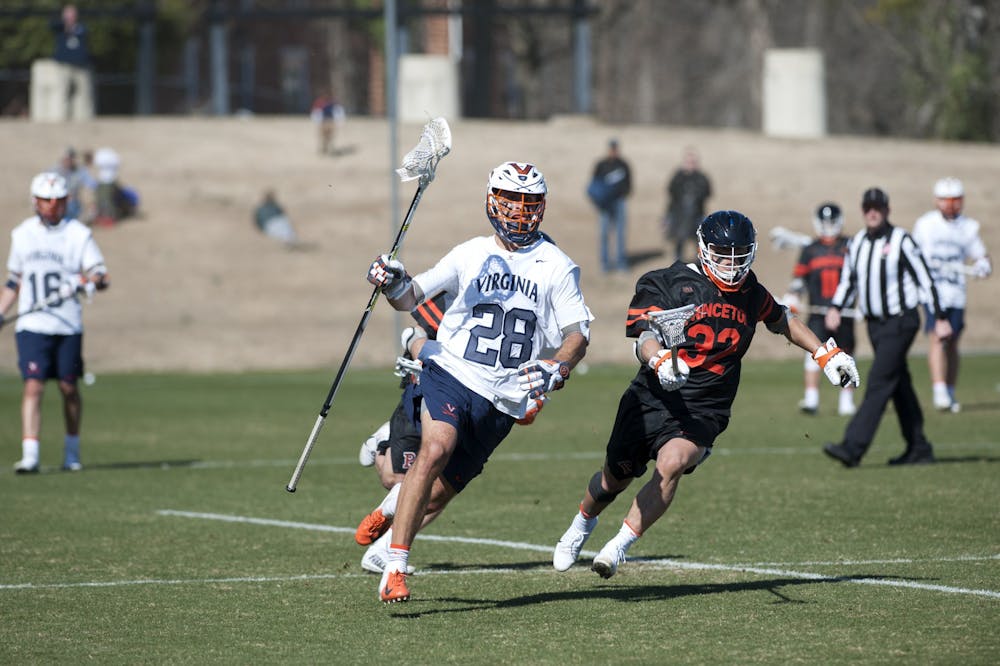Only six games into its 2020 campaign, Virginia men’s lacrosse — along with the rest of winter and spring collegiate sports — saw its season come to a jarring halt. While the NCAA is set to allow current seniors to return for an extra year of eligibility, it is tough not to wonder what this year’s men’s lacrosse team could have been.
Coming off a thrilling run to a national championship in 2019, the Cavaliers returned a plethora of key players and seemed poised to challenge once again for a title in May. Virginia entered the season as a consensus top two team in the nation, and despite suffering two early defeats against Princeton and Brown, the Cavaliers remained firmly among the nation’s best, finishing No. 11 in the USILA Coaches poll and No. 9 in the Inside Lacrosse media poll.
While there will be no official 2020 champion crowned, it’s still important to look at the season that could have been for Virginia and analyze if the team had what it would have taken to bring home another national championship.
Virginia’s start to 2020
Given the Cavaliers’ returning talent and experience headlined by seven of the ten starters from last year’s National Championship against Yale, Virginia slightly underperformed through six games compared to the lofty expectations placed on the squad at the beginning of the season.
On offense, with former All-Americans junior Matt Moore and senior Michael Kraus leading the charge, the Cavaliers were expected to roll through opposing defenses. However, even in season-opening wins against Loyola and Lehigh and once again in their first loss to Princeton, Virginia struggled to find consistency on offense, as they were subject to enduring long scoring droughts.
In the Princeton loss, an inexperienced defense — composed of junior Kyle Kology and freshmen Quentin Matsui and Scott Bower — finally gave way and were torched by arguably the nation’s best player in Princeton senior attacker Michael Sowers, and the offense simply couldn’t keep up.
Corrective actions were taken in the following games against High Point and Air Force, as the Cavaliers combined for 33 goals in well-rounded, explosive performances that were up to par with preseason expectations.
However, Virginia’s shortened season concluded with a close 13-14 loss to Brown in their first road game of the season, giving them a final record of 4-2.
Despite the bumps that the Cavaliers suffered in the early stages of the season, it is difficult to count the team out given that Virginia began its 2019 title run with losses in two of their first three games. Additionally, Princeton and Brown — the two teams accounting for Cavalier losses this year — each played Virginia to overtime in 2019 with the Cavaliers escaping on sudden death goals in both.
Roster potential
Looking at individual performances and improvement, there were certainly positives that would have boded well for Virginia going forward.
Junior goalkeeper Alex Rode upped his save percentage from just under 51 percent last year to over 55 percent through six games this season. Rode — named the NCAA tournament’s most outstanding player in 2019 — was critical to the Cavaliers’ late-season success last year, and continued exceptional play from him would have given Virginia a strong chance to make a deep run this year.
LaSalla also continued his strong play from last year, keeping his faceoff win rate hovering just under 59 percent.
Offensively, the Cavaliers enjoyed the emergence of redshirt freshman attacker Payton Cormier who finished the season with 12 goals and seven assists. Furthermore, Virginia saw Moore, Kraus and junior attacker Ian Laviano produce similar offensive outputs to what they posted last year with midfielders Aitken and Conners once again playing at an elite level.
On defense, the Cavaliers certainly showed growing pains with Kology leading a young group, but their early-season performances were undoubtedly promising in regards to the unit’s potential later in the year. The defense held three opponents to nine goals or less, and despite some shaky games in their other outings, it seemed it was only a matter of time before they would put it all together and consistently stifle opponents.
With the promise that the roster showed early, Virginia’s extremely difficult schedule lying ahead would have certainly given the Cavaliers a battle-tested and experienced squad by the season’s end — something that proved crucial in late game situations in last year’s NCAA tournament. Combine this with Coach Lars Tiffany leading the way, and it’s not difficult to see that Virginia was still in a prime position to defend their title.
While we will not be able to see how the rest of the season would have played out, the Cavaliers should once again be prepared to defend their national championship in 2021.
Despite the uncertainty surrounding the future status of current seniors, the team will regardless have plenty of offensive weapons and added experience on the defensive end. One of these weapons will include a former No. 1 recruit in freshman attacker Connor Shellenberger, who chose to redshirt this past season.
For now, Virginia fans can live with remaining the defending champions for one more year and perhaps using highlights from last year’s dramatic runs to lacrosse and basketball titles to pass the time.






